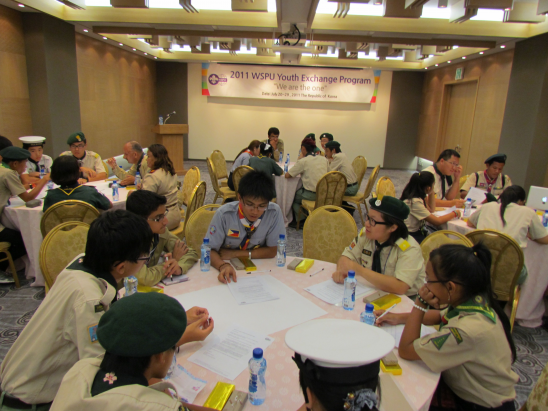
Scouts and Leaders from Ethiopia and Kenya will soon be arriving in Seoul, Korea to take part in the 2nd WSPU Youth Exchange Program from 12th to 21st January 2012. The program will give them the opportunity to experience Korean culture and discuss youth empowerment and youth participation in the decision making process.
A total of 13 participants (Scouts and Leaders) will be sharing the cultural experience throughout Korea, starting with Seoul, and then moving to the South East of the peninsula to go to Gyeongju, where they will learn more about Korea's history. Participants will then move to the North East Taekbaek Cirty, where they will get to experience soeme teambuilding activities in the snow. Their journey will finally end back in Seoul, where the international participants will experience a homestay program with families of local Scouts.
The youth program will also involve a discussion on youth participation in the decision making process by discussing what young people can do to take an active part an active in their societies and having their voices and opinions heard.
Conclusions of the group discussions, videos and photos of the event will be posted on wspu.info, after the event concludes on 21st January 2012.
The World Scout Parliamentary Union (WSPU) is an international organization, which unites Scout-oriented parliamentarians from all over the world and brings them into closer contact with the World Scout Movement. Its objective is to strengthen both National Scout Organizations and World Scouting through the influence of parliamentarians who believe in Scouting as an effective non-formal educational method and Movement.
One of its aims is to encourge the formation of national Scout Parliamentary Associations (NSPAs) and through these NSPAs, the WSPU hopes to open doors and give the Scout Movement access to decision-makers involved in problems directly concerning young people and the communities in which they live.
FRANÇAIS
Le 2éme Programme d'échage de jeunes de I'UPMS démarre le 12 janvier 2012
Des Scouts et Leaders d'Ethiopie et du Kenya arriveront bientôt à Séoul, en Corée du Sud pour participer au 2éme Programme d'échnge de jeunes de I'UPMS, du 12 au 21 janvier 2012. Le programme leur offrira l'opportuité d'avoir une expérience de la culture coréenne et de discuter de l'autonomisation des jeunes et de leur participation dans le processus de décisoin.
Un total de 13 participants (Scout et Leaders) partageront l'expérience culterelle à travers la Corée, en commençant par la capitale Séoul, puis en se dirigeant vers le sud-est de la péninsula pour aller à Gyeongju, où ils apprendront un peu plus à propos de l'histoire de la Corée du Sud. Les participants voyageront ensuite vers le nord-est ves la cité de Taebaek, où ils participeront à des execices de construction d'équipe dans la neige. Leur voyage se terminera finalenemt à Séoul, où les participants internationaux pourront avoir l'expérience de rester avec une famille d'accueil des Scouts locaux.
Le programme des jeunes inclura également une discussion sur la participation des jeunes au processus de décision, en discutant des opportunités offertes aux jeunes de prendre une part active dans leurs sociétés et d'assurer que leurs voix et opinions soient entendues.
Les conclusions des groupes de discussions des vidéos et photos seront mises en ligne aprés la fin du programme, soit aprés le21 jauvier 2012.
L'Union Parlementaire Mondiale du Scoutisme (UPMS) est une organisation internationale qui réunit parlementaries socutes du monde entier et qui les rapproche du Mouvement Scout Mondial. Son objectif est de renforcer à la fois les Organisations Scoutes Nationales et le scoutisme Mondial gràce à l'influence des parlementaires qui croient au Mouvement Scout, ainsi qu à sa méthode efficace basée sur l'éducation non-formelle.
Un de ses buts est d'encourager la création d'Associations Parlementaires Nationales du Scoutisme (APNS), aux trevers desquels, l'UPMS espére ouvrir des postes aux Scouts afin de leur donner accés aux décideurs qui sont directement impliqués ar les problémes liésaux jeunes et aux communautés dans lesquelles ils vivent.
